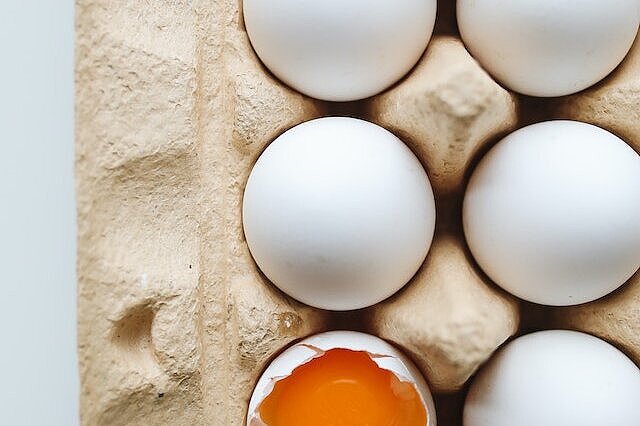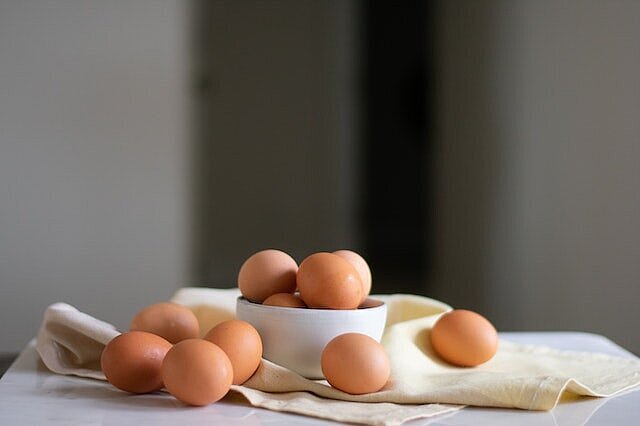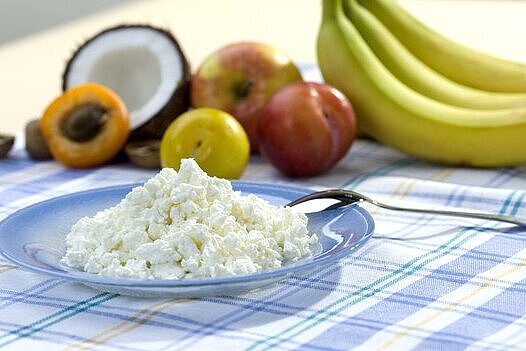Egg yolk

The benefits of egg yolk for dogs
Egg yolks can have some health benefits for dogs when fed in moderation. For example, egg yolk can:
- Make the coat shinier and smoother as it is rich in biotin and lecithin. These substances support the formation of keratin, the main component of hair and nails.
- Promote digestion, as it is easily digestible and contains enzymes that can improve food absorption.
- Strengthen the immune system as it contains antioxidants such as vitamins A and E as well as selenium. These protect the cells from free radicals and inflammation.
- Improve brain function as it contains choline. This nutrient is important for the formation of acetylcholine, a neurotransmitter that enables communication between nerve cells.
The disadvantages of egg yolk for dogs
However, egg yolk is not only good for dogs. It can also have some disadvantages if fed too often or too much. For example, egg yolk can:
- Lead to obesity as it is very high in calories. One egg yolk has about 60 calories, which is about 10% of a small dog's daily calorie requirement. If you give your dog too much egg yolk, he can gain weight and develop health problems.
- Lead to diarrhea because it contains a lot of fat. Fat can disrupt the intestinal flora and lead to digestive problems. Too much fat can also put a strain on the pancreas and lead to pancreatitis, a severe inflammation of the gland.
- Lead to a salmonella infection if fed raw. Salmonella is a bacteria that can be found in raw eggs and can lead to vomiting, diarrhea, fever and lethargy. To minimize the risk, you should only feed cooked or pasteurized egg yolks.
How much egg yolk can my dog eat?
As with all foods, the same applies to egg yolk: the quantity makes the poison. Giving your dog a boiled or pasteurized egg yolk from time to time can be a tasty and healthy addition to their diet. However, you should not feed more than one egg yolk per week and make sure that your dog does not have an allergy or intolerance to eggs.
Egg yolk is a nutritious food that can have many benefits for dogs. It can make the coat shiny, aid digestion, strengthen the immune system and improve brain function. However, egg yolk should only be fed in moderation, as it can also have disadvantages. It can lead to obesity, diarrhea or a salmonella infection. Also, egg yolks should always be cooked or pasteurized to reduce the risk of infection. By giving your dog an egg yolk every now and then, you can give him a treat and support his health.
Properties 16
Are you looking for other ingredients with a specific property?
Just click on them to find more.
If you notice any signs of hypersensitivity or poisoning in your dog, you should see your vet immediately. We are not a substitute for a vet, but we try to be as accurate as possible. Every dog reacts differently and we recommend you get a second opinion or consult your vet if in doubt.
Stay healthy and take good care of your four-legged friend!😊
Similar to Egg yolk
Protein is an organic compound consisting of amino acids. There are 20 different amino acids that can be combined in various ways to form proteins. The dog's body can produce some amino acids...
Eggs are the fertilized or unfertilized egg cells of birds, usually chickens. They consist of a shell, an egg white and an egg yolk. Eggs contain many nutrients such as proteins, fats, vitamins and...
Quark is a fresh cheese made from milk. The milk is curdled by lactic acid bacteria or rennet and the whey is then separated out. The result is a white, creamy cheese that varies in firmness...
Yoghurt is a dairy product made by fermenting milk with certain bacterial cultures. This converts the lactose, i.e. the milk sugar, into lactic acid. This gives yogurt its typical taste and creamy...



